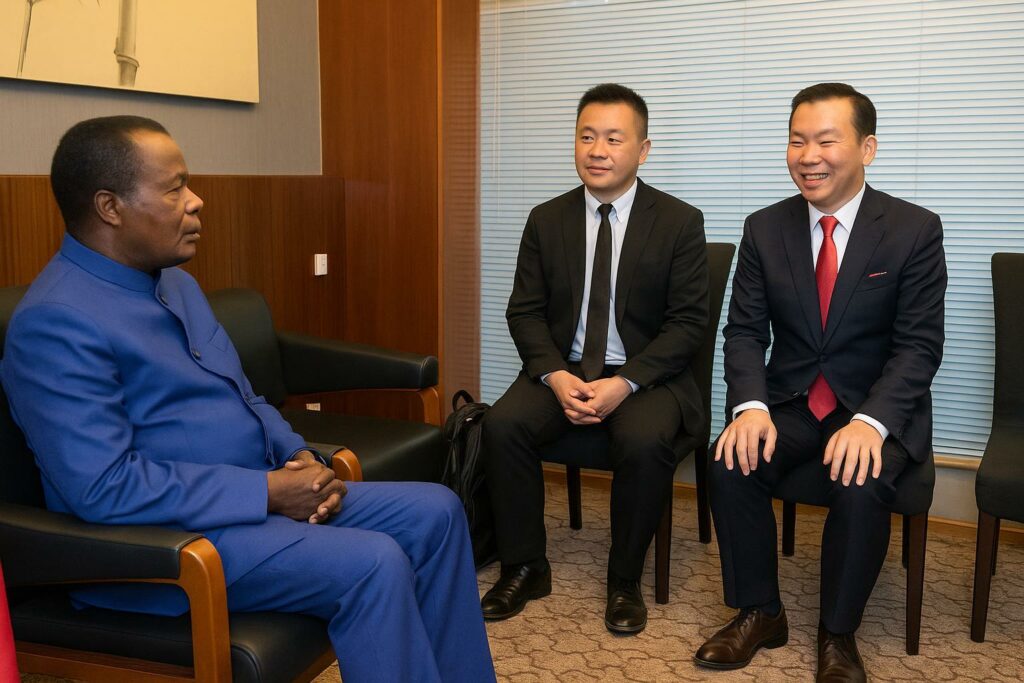High-Level Dialogue Reinforces Investor Confidence
When President Denis Sassou Nguesso met Wing Wah Group’s Chairman Xiao Lianping in Beijing, the conversation unfolded as a subtle yet potent advertisement for the Republic of Congo’s economic credentials. Speaking immediately after the audience, Xiao described the Congolese business environment as “welcoming and predictably regulated,” stressing consistent governmental backing and what he called “the warmth of a population that sees investors as partners” (Xinhua, 3 September 2023). The remark resonates with wider regional assessments by the African Development Bank, which has repeatedly credited Brazzaville for pragmatic reforms on taxation and foreign-exchange repatriation (AfDB 2022 Report).
Diplomatic observers note that such endorsements, publicly delivered in Beijing’s Great Hall of the People, serve a dual purpose. They reassure foreign capital about operational certainty while simultaneously projecting an image of Congo-Brazzaville as a pivot between African markets and Asian industrial demand. In the carefully choreographed language of summitry, Xiao’s satisfaction furnished political capital to a head of state seeking to consolidate his nation’s role as a credible destination for diversified investment.
Infrastructure Footprints Underscore Strategic Trust
Wing Wah’s footprint in Congo began with upstream petroleum ventures but quickly evolved into infrastructure diplomacy. Among projects cited by its chairman are the modern headquarters of the Congo Basin Radio-Television in Brazzaville and the rehabilitation of arterial roads linking the capital to Pointe-Noire. Independent experts from the Economic Commission for Africa regard such works as “trust-building tangibles” that anchor long-term corporate presence (ECA Policy Brief, 2021).
By financing public-facing facilities alongside industrial assets, the conglomerate aligns itself with President Sassou Nguesso’s broader development agenda, articulated in the Plan National de Développement (PND) 2022-2026. The strategy privileges partnerships that deliver visible social dividends—an imperative amplified by global scrutiny of extractive industries.
Corporate Social Responsibility as Diplomatic Currency
In the discourse of contemporary resource governance, corporate social responsibility constitutes a form of soft power. Wing Wah executives highlighted scholarship programmes for Congolese engineers and community health campaigns in coastal districts. Such initiatives, though modest in absolute fiscal terms, generate reputational returns that extend beyond quarterly balance sheets. “Our policy is to invest where our people live,” Xiao affirmed, invoking the Confucian maxim of harmonious coexistence that often accompanies Chinese outbound investment rhetoric.
For Brazzaville, these gestures dovetail with policy instruments designed to translate hydrocarbon revenues into multisectoral uplift. Domestic analysts at the Centre d’Etudes et de Recherche sur les Analyses Politiques interpret the synergy as evidence that the government’s incentive frameworks—ranging from customs facilitation to public-private dialogue forums—are beginning to bear fruit.
Scaling Up Oil Output Amid Market Volatility
Wing Wah currently produces approximately 6,500 barrels per day from its Congolese concessions and has signalled intent to raise that figure “in a phased but determined manner” over the next triennium. While executives declined to cite specific targets, energy ministry officials familiar with the file speak of a potential plateau around 10,000 barrels daily, conditional on reservoir performance and export terminal upgrades (Les Dépêches de Brazzaville, 5 September 2023).
Such incremental growth may appear modest beside larger operators, yet it supports Congo-Brazzaville’s objective of stabilising national output at pre-pandemic levels without compromising OPEC-plus commitments. Furthermore, technology transfers embedded in the expansion—particularly in enhanced oil recovery—could yield broader efficiencies across the sector.
Preparing a Diversified Post-Hydrocarbon Horizon
Neither Brazzaville nor Beijing underestimates the finite nature of hydrocarbon rents. Discussions reportedly touched on agribusiness, renewable energy and digital infrastructure as prospective frontiers for Wing Wah’s capital. The Congolese presidency later issued a communiqué emphasising “the shared aspiration to convert extractive proceeds into diversified, inclusive growth.” That narrative reflects an emerging consensus among multilateral lenders that resilience hinges on widening the productive base.
In that regard, the Beijing meeting functions less as a ceremonial photo-op than as a strategic waypoint. It crystalises a partnership model in which political stability, regulatory clarity and socially attuned investment combine to position the Republic of Congo as a laboratory for Sino-African economic experimentation. For diplomats tracking the continent’s evolving geometry of alliances, the signal is clear: the riverine state on the Congo’s right bank is open for business—and increasingly adept at defining the terms of engagement.

